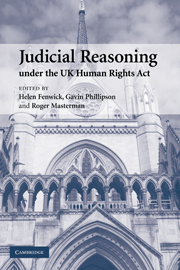Book contents
- Frontmatter
- Contents
- List of contributors
- Foreword
- Preface and acknowledgments
- Table of cases
- Table of legislation
- Table of treaties
- 1 The Human Rights Act in contemporary context
- PART I The interpretation of the Human Rights Act 1998
- PART II The Human Rights Act and substantive law
- 9 The common law, privacy and the Convention
- 10 Judicial reasoning in clashing rights cases
- 11 Family law and the Human Rights Act 1998: judicial restraint or revolution?
- 12 Article 14 ECHR: a protector, not a prosecutor
- 13 Criminal procedure, the presumption of innocence and judicial reasoning under the Human Rights Act
- 14 Concluding remarks
- Index
9 - The common law, privacy and the Convention
Published online by Cambridge University Press: 30 October 2009
- Frontmatter
- Contents
- List of contributors
- Foreword
- Preface and acknowledgments
- Table of cases
- Table of legislation
- Table of treaties
- 1 The Human Rights Act in contemporary context
- PART I The interpretation of the Human Rights Act 1998
- PART II The Human Rights Act and substantive law
- 9 The common law, privacy and the Convention
- 10 Judicial reasoning in clashing rights cases
- 11 Family law and the Human Rights Act 1998: judicial restraint or revolution?
- 12 Article 14 ECHR: a protector, not a prosecutor
- 13 Criminal procedure, the presumption of innocence and judicial reasoning under the Human Rights Act
- 14 Concluding remarks
- Index
Summary
Introduction
The issue of how the common law has been developed in order to protect a right to privacy against the media under the impetus of the Human Rights Act is, I believe, of great interest to the theme of judicial reasoning under that instrument. As indicated in Chapter 6, it was in response to press fears that the Act would lead to development of such a right that what became s.12 of the Act was introduced by the government. Because of the relatively flexible and inchoate state of the breach of confidence action even prior to the coming into force of the HRA, there was considerable scope for judicial creativity in fusing Strasbourg principles with evolutionary common law reasoning in order to fill a long-lamented lacuna in English law: the provision of a remedy for the unauthorised publication of personal information. It was not surprising, to this author at least, that the judiciary chose this route and firmly declined the alternatives of either giving direct horizontal effect to Article 8 or ‘declaring’ the existence of a general tort of invasion of privacy. As far back as 1979, Megarry VC remarked in Malone v. Metropolitan Police Commissioner (No. 2) in respect of the creation of privacy rights:
it is no function of the courts to legislate in a new field. The extension of the existing laws and principles is one thing, the creation of an altogether new right is another … No new right in the law, fully-fledged with all the appropriate safeguards, can spring from the head of a judge deciding a particular case: only Parliament can create such a right.
- Type
- Chapter
- Information
- Judicial Reasoning under the UK Human Rights Act , pp. 215 - 254Publisher: Cambridge University PressPrint publication year: 2007
- 2
- Cited by



